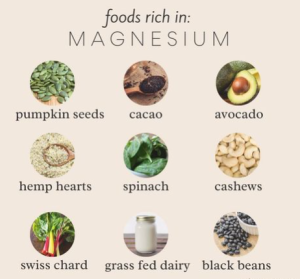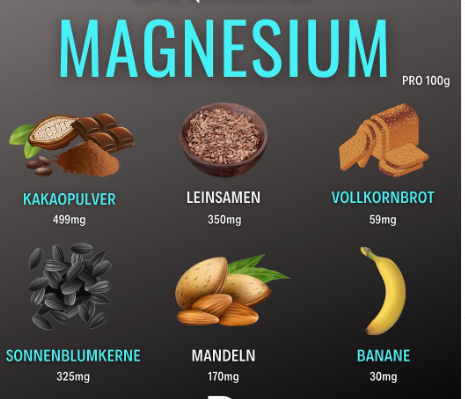Table of Contents
Magnesium is a useful mineral that is involved in many processes in our body. Among them are the functioning of the nervous system and the absorption of energy from food.
Magnesium plays an important role in many vital processes that take place in cells. For example, it is involved in the transmission of neuromuscular impulses. It also regulates the metabolism of muscle, heart and nerve tissues. The good news is that it is found in abundance in vegetables!
Magnesium is also related to mood, it regulates the production of serotonin and melatonin.
According to 2020 studies, magnesium deficiency can cause chronic stress and depression. In addition, it strengthens the bone and muscle structures in our body.
Food Rich in Magnesium: Source of Magnesium
Magnesium is one of the essential components of chlorophyll , the green pigment in plants. Therefore, it is not surprising that it is found in large quantities in vegetables with dark green leaves. Fruits and vegetables account for an average of a full quarter of all magnesium ingested. It is also found in high amounts in legumes, nuts, dried fruits, bananas, chocolate, and whole grains. Processed cereals (white bread, polished rice, etc.) contain less magnesium because it is found mainly in the outer shell of the grain: the bran, which is removed during processing.

This mineral can be naturally replenished with healthy nutrients. Such food is:
- Pumpkin seeds
- Chia
- Almonds
- Spinach
- peanuts
- oats
- dark chocolate
- Avocado
- green beans
- Banana
What daily amount of magnesium should you take?
According to the European Food Safety Authority, men over the age of 18 need a daily amount of 350 mg and women 300 mg. During pregnancy and lactation the same amount is recommended.
And although 2/3 of all magnesium in the body is concentrated in the skeleton , we are not talking about some kind of reserve for the needs of the body. In fact, the magnesium contained in the bones is a kind of buffer , which, together with the magnesium contained in the blood, helps to maintain an appropriate level of this substance outside the cells. Therefore, it is necessary to ensure the daily intake of a sufficient amount of magnesium, since the normal course of more than 300 different metabolic reactions in the body depends on this delicate balance .
How can I ensure a good intake of magnesium?
Two servings of fruit and two servings of vegetables a day are enough, as well as many whole grain products. You can also eat nuts.
You can meet your magnesium needs with the following daily plan:
Breakfast: Two slices of whole wheat bread with cream cheese, gouda, fresh parsley and a glass of whole milk
Lunch: Spinach with potatoes and fish + mineral water
Some people with difficulties in assimilating magnesium or with risk factors to eliminate it, will need to consult with their doctor about the use of supplements to obtain better results.
Magnesium is an essential mineral, its deficiency notably affects health, due to its distribution in the body, the lack of magnesium can alter the functioning of various body systems, so ensuring adequate intake brings benefits that you may not know .
Health benefits of Magnesium
The health benefits of magnesium are multiple. We summarize them:
1. Defend the body
It acts in the defense of the organism, immunity and growth. It is also essential for energy production.
2. It has a regulatory function in your body
In addition, it helps you get energy because it stabilizes proteins, glucose and cell membranes.
3. It is a natural relaxant
By acting directly on the nervous system, it relieves your nervous and muscular tension. It also regulates blood pressure. Ideal if you are subjected to excessive work and worries.
4. Prevents type 2 diabetes
Improves blood sugar levels, which can help prevent type 2 diabetes.
5. Strengthens bones and teeth and prevents cavities and osteoporosis
Since it collaborates in the fixation of phosphorus and calcium in the bones.
6. Protects tissues and organs
By regulating body pH, it protects organs and tissues, helping you prevent cardiovascular, kidney and digestive diseases.
7. It is basic in many biochemical reactions
In the fixation of calcium and phosphorus in bones and teeth. In protein synthesis and muscle function.
Magnesium: Contraindications
Side effects of a high intake of magnesium are not very common, since, in healthy people, the kidneys eliminate excess of this mineral through the urine. However, the maximum recommended dose should not be exceeded, in case of consuming food supplements.
Additionally, magnesium supplements may interfere with certain medications or be contraindicated in certain conditions. For this reason, pharmacies should always be consulted if their consumption could be indicated and how they should be taken.
What is the best time to take them?
Many specialists recommend getting up on an empty stomach so that it is better absorbed, or before going to bed to promote sleep and relaxation. However, consult your doctor or your pharmacy.
What is magnesium used for in human body ?
Magnesium is the first defense against increased fatigue ! This is due, in part, to the role of magnesium in the body’s energy production. It is also involved in the transmission of nerve impulses and in muscle contraction , and this is extremely important for the functioning of the cardiovascular system and muscle relaxation. Thanks to this last property, it helps to cope with cramps (during pregnancy, after exercise, etc.).
In addition, it is involved in the synthesis of proteins, contributes to the maintenance of healthy bones and teeth , and also regulates the process of cell division. And, finally, it contributes to the maintenance of psychological functions (memory, speech, thinking, attention, etc.). This, in particular, explains its well-known ” anti-stress ” effect.
Magnesium Properties
Symbol : Mg
Atomic mass : 24.305 u
Electronic configuration : [Ne] 3s2
Atomic number : 12
Density : 1.738 g/cm³
Melting point : 650 °C
Discoverers : Humphry Davy , Joseph Black

